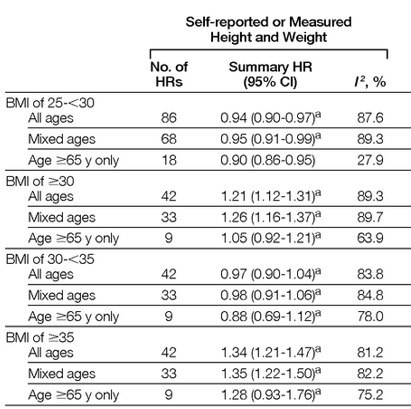Conventional Med
Excess Weight Is Healthy, Even to the Point of Obesity: JAMA Study
Mortality is lower for weights that doctors define as overweight – and even obese – than so-called ‘normal’ weight. Doctors have gotten it all wrong yet again. But it means extreme obesity is even more dangerous than they knew.
For everyone out there who’s been struggling to lose those few extra pounds, perhaps it’s time to stop the fight. Modern medicine has had it wrong, dead wrong. A new study, published in the Journal of the American Medical Association (JAMA), has documented that the advice we’ve been getting about weight has been nearly all wrong.
Doctors have aggressively defined having a body mass index (BMI) greater than 25 as overweight, and have claimed that your risk of dying is greater as soon as you hit a BMI of 25. The study, though, shows the opposite is true. That “excess” fat isn’t actually excessive. In fact, it can be protective of your health.
Study Background
The study by lead researcher Katherine M. Flegal, of the National Center for Health Statistics of the CDC, examined all-cause mortality for 3 million people[1]. She had already done another study, published in JAMA in 2005[2], which compared mortality of people with a BMI greater than or equal to 30, the standard definition of obesity, but didn’t investigate those classed as overweight, with a BMI greater than 25 and less than or equal to 30. Then, in 2007, she produced a second study, also published in JAMA[3], which demonstrated that people classed as Overweight (BMI >25 and ≤30) have lower mortality rates than those of “Normal” weight. It used the NHANES database.
She decided that she needed to do the same sort of study again, but using a larger number of people and a different database. That study is the one just published. Even those who are not happy with her results acknowledge that Flegel is an excellent and rigorous researcher.
The Study
The subjects of the new study were categorized by BMI:
- Normal Weight: BMI >18.5 and ≤25
- Overweight: BMI: >25 and ≤30
- Grade 1 Obesity: >30 and ≤35
- Grades 2&3 Obesity: ≥35
Flegel and her team did a meta analysis that included about 3 million adults and more than 270,000 deaths. They found:
- Those classed as Overweight had a 6% lower risk of death than those classed as Normal.
- Those classed as Grade 1 Obese had a 5% lower risk of death than those classed as Normal.
- Those classed as Grades 2 & 3 Obese had a 29% increased risk of death!
 To the right is a summary from the study. It shows the hazard ratios (HRs) that the study found.
To the right is a summary from the study. It shows the hazard ratios (HRs) that the study found.
The column “No. of HRs” refers to the number of studies in the meta analysis that held data used in that particular statistic.
The “Summary HR (95% Cl)” column is the one of interest. It gives the range of results they saw in the different studies, plus the summary of all of them. For example, the HR for everyone with a BMI of 25-30 (Overweight) is .94, which means that they were only 94% as likely to die as those of “Normal” weight.
If you treat everyone with a BMI over 30, you’ll see that, overall, they are 1.21 times more likely to die than the “Normals”. These are all the people classified as Obese combined. If that’s all you look at—which is what doctors have been doing for the last several decades—you’ll get the impression that everyone with a BMI over 30 is at greater risk. But that’s far from the truth.
If you break out those who are Grade 1 Obese from those who are Grades 2 & 3 Obese, the picture looks different. Those with a BMI of 30-35, Grade 1 Obese, had just 97% the risk of Normals. But, those at the high end of obesity, Grades 2 & 3 (BMI greater than 35) were 1.34 times more likely to die than Normals.
How Did Doctors Get It So Wrong for So Long?
What have doctors and medical researchers misunderstood for so long? After all, they’ve been giving us exceedingly bad advice, causing thousands, probably millions, of people to try to lose weight that, if they were successful, actually placed them at greater risk of death. That’s a very serious lapse of judgement.
What they did is precisely what they claim not to do. They assumed that certain things were true, but did so without any evidence. They assumed that a weight range they believed to be healthy was, by definition, ideal. Thus, they defined any BMI over 25 to be, at a minimum, Overweight. Then, they assumed that there must be a simple progression—that the more you weighed over your “ideal” weight, the worse your health.
They simply didn’t bother to look. If they had, they’d have seen the truth. Only the most Obese are harmed by it. Those in between are actually better off for carrying what doctors would call “excess” weight.
Could they have known if they hadn’t relied so heavily on their self-styled “evidence-based medicine”? The truth is, they probably could have if they’d taken their roles as healers seriously and used their own powers of observation. In other words, if they’d relied on anecdotal evidence—the evidence of their own eyes and experience—they would likely have spotted the truth.
In fact, they must have had to unlearn it, because a century ago, before they’d completely shrouded their eyes with pseudo science, they did know. As the New York Times reports[4], a century ago, the ideal woman, whom Cornell University’s medical examiner described as a woman “whose very presence bespeaks health”, was Elsie Scheel. Her BMI was 27, which is now classified as Overweight. It is also right in the middle of the range that Flegel’s study demonstrates is the true ideal weight, the one that truly speaks of health.
Doctors have given up their ability to think for themselves, to observe and utilize their observations. A hundred years ago, they didn’t need all the gimmicks and tools and tests they have today. There was no need to put a woman through a scan during labor to see what position her baby was in, because simple palpation told them. They didn’t need to put the mother and baby at risk from unneeded radiation, and they didn’t need to have a scientific study prove it to them. They were master observers, a skill they’ve given up.
As a result, they’ve presumed to be the arbiters of things for which they have simply been wrong. They’ve pressed people to stay out of the sun and slather on cancer-inducing sunscreens. The result is a rising toll of chronic diseases and cancer. They swore by their “evidence based medicine”—and they were wrong. They pushed HRT on women, as if menopause were a disease. We have no idea how many women died early as a result. They push statins, even to the point of advocating that they be put in drinking water or handed out like condiments at fast food restaurants, ignoring their patients’ reports of muscle pain and other symptoms. How many died early as a result? They put fear into women to have mammograms routinely, completely ignoring the risks of radiation and the fact that the death rate from breast cancer has hardly changed. They put fear into men so they’ll submit to routine prostate tests, and with the same kind of results.
Yet, they still seem to believe that they should be the only ones who have the right or authority to give medical advice, and that anyone else doing so belongs in prison.
They’re wrong. On the issue of weight, they’ve pushed people into losing weight that was protective, and they’ve missed that the people at the top end of Obesity are at even more risk than they’d realized.
Just how much harm are we going to allow before we take our medical system back? It’s hard to imagine that we could possibly do a worse job than they have.
Sources:
- Association of All-Cause Mortality With Overweight and Obesity Using Standard Body Mass Index Categories, JAMA; Katherine M. Flegal, PhD; Brian K. Kit, MD; Heather Orpana, PhD; Barry I. Graubard, PhD; doi:10.1001/jama.2012.113905
- Excess Deaths Associated With Underweight, Overweight, and Obesity, JAMA; Katherine M. Flegal, PhD; Barry I. Graubard, PhD; David F. Williamson, PhD; Mitchell H. Gail, MD, PhD; doi:10.1001/jama.293.15.186
- Cause-Specific Excess Deaths Associated With Underweight, Overweight, and Obesity, JAMA, Katherine M. Flegal, PhD; Barry I. Graubard, PhD; David F. Williamson, PhD; Mitchell H. Gail, MD, PhD; doi:10.1001/jama.298.17.2028
- Study Suggests Lower Mortality Risk for People Deemed to Be Overweight
Tagged bmi health, body mass index, conventional medicine, extra weight healthy, fat health, jama overweight study, jama study obesity health, jama weight study, modern medicine, modern medicine obesity, obesity, obesity health, overweight, science, study weight jama mortality, weight mortality





















Pingback: Excess Weight Is Healthy, Even to the Point of Obesity: JAMA StudyGaia Health | ChronicFatigue Fibromyalgia
Pingback: With No Evidence, AMA Votes that Obesity Is a Disease
Pingback: Easy AdSense Money Generator
Pingback: ys2GwioiJr ys2GwioiJr
Pingback: sam mansi
Pingback: free business listing sites
Pingback: free website domain
Pingback: best internet marketing training
Pingback: scripts for free
Pingback: seo ranking
Pingback: laptop computers
Pingback: search engine optimization consultant
Pingback: read more
Pingback: karen millen dresses
Pingback: cheap seo services uk
Pingback: belstaff motorcycle clothing
Pingback: karen millen outlet uk
Pingback: q9s60v8nD8 q9s60v8nD8
Pingback: This is the link
Pingback: mca
Pingback: bikram yoga clothes
Pingback: tjene penger
Pingback: thehaydaycheats.com
Pingback: computer pclback
Pingback: thehaydaycheats.com
Pingback: festivalofchildrensbooks.org
Pingback: marketing halifax